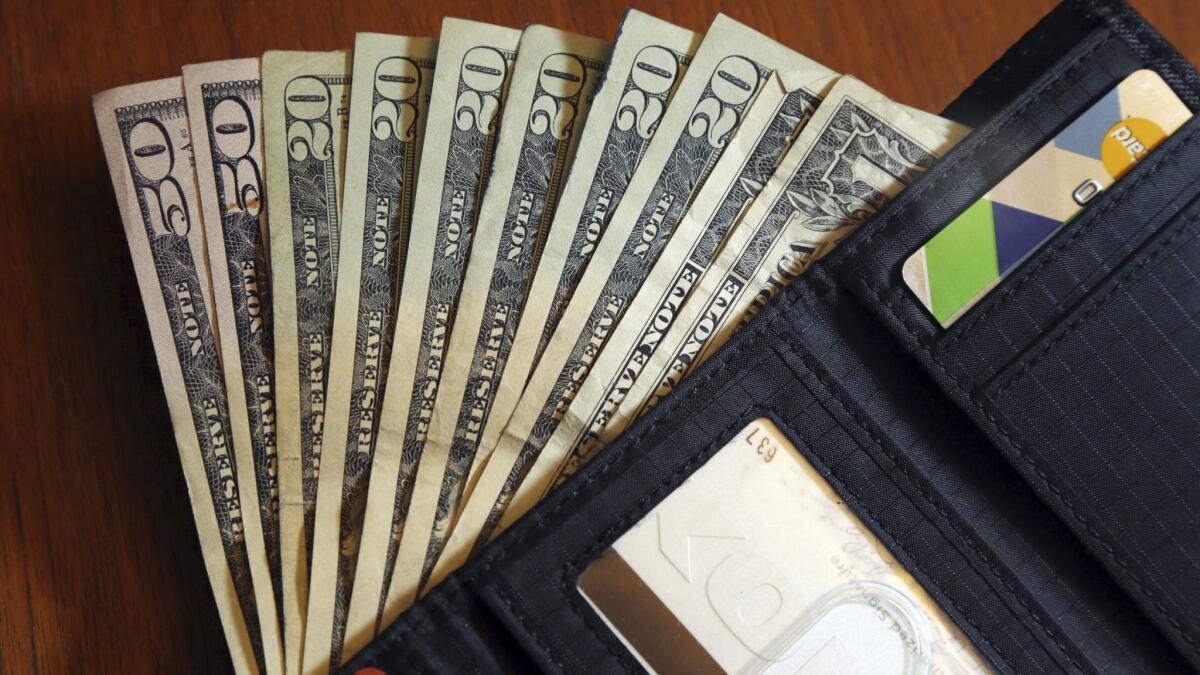Experiment with ‘lost’ wallets reveals that people are surprisingly honest

- Share via
They say honesty is the best policy — and now there’s scientific evidence to prove it.
An unconventional study that offered volunteers the chance to pocket nearly $100 found that the more people stood to gain by hiding the truth, the more likely they were to come clean.
The results, published Thursday in the journal Science, offer surprising insights into the ways that money influences honesty.
The findings could help shape policies that encourage conscientious behavior in a range of situations, researchers said. The Internal Revenue Service could design its forms in a way that discourages people from cheating on their taxes, for example, while insurance companies could change the way they collect information about a car accident so that lying becomes less appealing.
“Honesty is essential for almost all social and economic relations,” said Michel Maréchal, an economics professor at the University of Zurich who helped lead the study.
Scientists have studied how the temptation of money affects honesty in laboratory settings, but little is known about how they’re related in the real world — especially on a global scale.
So a team of economists devised an experiment involving more than 170,000 “lost” wallets that turned up in 335 cities across 40 countries, from Indonesia to Ghana to Brazil.
Each wallet contained a grocery list, a key, and three business cards with the same male name and email address. Some of them had no money, while others had the equivalent of about $13.50.
To kick off the experiment, a research assistant brought a wallet to the front desk of a hotel, bank, post office or other public place. He or she would claim to have found it on outside and push it toward the person behind the desk.
“Somebody must have lost it,” the research assistant would tell the unwitting employee. “I’m in a hurry and have to go. Can you please take care of it?”
The study authors hypothesized that employees would be more likely to email the wallet’s “owner” (using the address on the business card) if it contained no cash. After all, economists assume people will behave rationally and maximize their utility — which in this case would mean keeping the $13.50 windfall.
But that’s not what happened.
“Much to our surprise, we observed the opposite effect,” Maréchal said. “People were more likely to return the wallet when it contained a higher amount of money.”
READ MORE: Science proves it: Money really can buy happiness »
In the experiment, 51% of wallets with cash were returned, compared with 40% of those without bills or coins.
And people were not treating themselves to a finder’s fee. Spot checks of the wallets showed that 98% of the money was turned in.
“When there was something missing, it was coins,” said study leader Alain Cohn, a behavioral economist at the University of Michigan. In those cases, he said, the researchers figured the coins simply “fell out of the wallet.”
Perhaps $13.50 was such a pittance “that people simply wouldn’t bother stealing it,” said co-author Christian Zünd, a graduate student at the University of Zurich. So the researchers expanded their experiment to include wallets with the equivalent of about $94.
The extra cash seemed to induce yet more honesty. Wallets with the big bucks were returned 72% of the time, compared with 61% of the wallets with less money and 46% of wallets with no cash. Once again, the economists were stumped.
“Why are people more likely to return a wallet that contains more rather than less money?” Zünd said.
Perhaps people were afraid of getting into legal trouble if they kept the money for themselves. The researchers checked to see if the return rates were higher when the wallet was dropped off in the presence of witnesses or security cameras, but those factors didn’t seem to make a difference. Nor was there a correlation between return rates and local lost-property laws.
If people weren’t acting out of fear or being influenced by peer pressure, maybe they were sincerely concerned about the well-being of the wallet’s “owner.” So the researchers introduced “lost” wallets that contained money but no key. The result: Employees were 9.2% more likely to return a wallet with a key than a wallet without one — a sign of altruism, the study authors said.
But that wouldn’t explain why wallets with $94 were returned at higher rates than wallets with $13.50. The researchers conducted a survey in the U.S., the United Kingdom and Poland (the three places where big-money wallets were “lost”) and asked people to rate how much they would feel like thieves if they kept a wallet, with or without money.
Keeping a wallet with no money in it did not feel like stealing, Zünd said. “With money, however, it suddenly feels like stealing, and it feels even more like stealing when the money in the wallet increases.”
In other words, the more money the ”lost” wallet contained, the greater the psychological cost of seeing oneself as a thief. That was a price people didn’t want to pay.
The results bolster the idea “that people care about maintaining a positive moral view of themselves,” said Nina Mažar, a Boston University behavioral economist who was not involved in the study.
Policymakers could use this insight to encourage better behavior among citizens “by making it more difficult for them to convince themselves that they are honest, when in fact, they did something wrong,” Cohn said.
Previous research has shown that reminding people about their moral standards just before they perform a specific task helps reduce their temptation to cheat. For example, people were more likely to fill out an insurance form honestly if they had to sign an honor statement at the beginning of the form rather than at the end.
Future studies should test whether these results would hold up if the owner of the “lost” wallet appeared to be a foreigner, according to Shaul Shavi, who studies behavioral ethics and economics at the University of Amsterdam.
“People find it worthwhile to act kindly toward members of their own group but not members of other groups,” he wrote in an essay that accompanies the study.
Mažar said she’d like to know more about how honest behavior varies across countries. In the experiment, for instance, the odds of a wallet with money being returned were more than three times higher in Switzerland than in China.
“We want to understand, ‘What are the commonalities, what are the differences?’” Mažar said. “Because if we understand those, maybe we’ll have a better sense of how we could increase civil honesty on a much larger scale or reduce corruption.”






